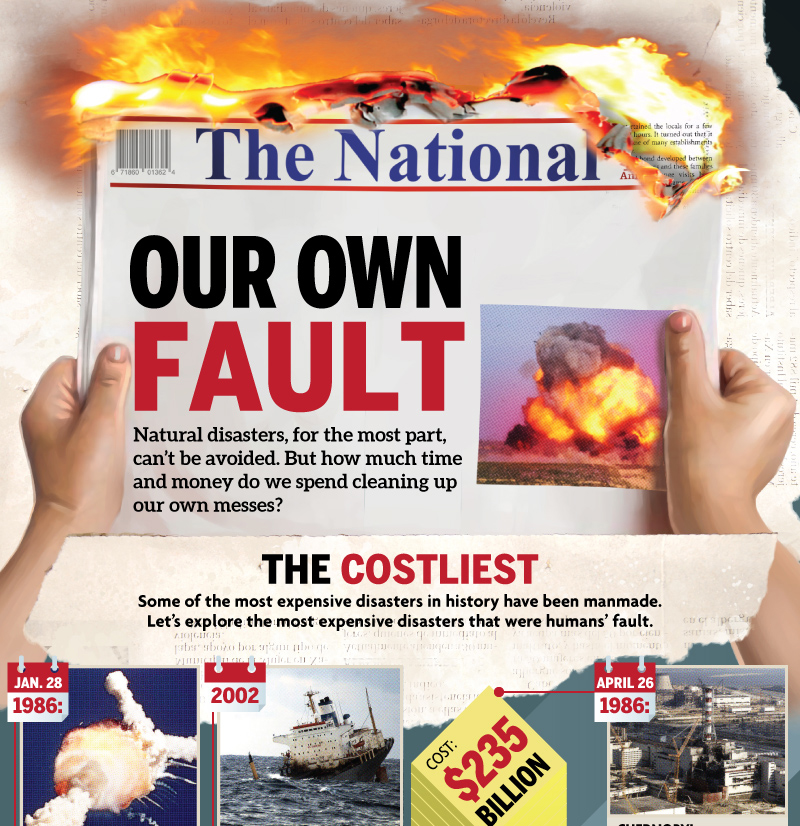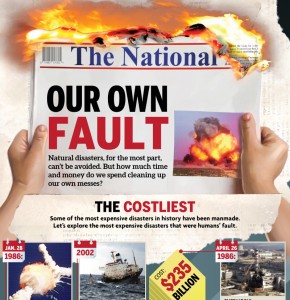
Man-Made Disasters: Our Own Fault
Natural disasters, for the most part, can’t be avoided. But how much time and money do we spend cleaning up our own messes?
The Costliest
Some of the most expensive disasters in history have been man-made. Let’s explore the most expensive disasters that were humans’ fault.
Jan. 28, 1986: Challenger explosion
Cost: $5.5 billion
The Challenger rocket was in the air for just over 60 seconds when an O-ring destroyed the rocket and killed the seven astronauts on board. Because of the faulty O-ring, freezing conditions in space and poor organization, the rocket exploded seconds after it was launched. This led to NASA activities being suspended to overhaul safety procedures.
2002: Prestige Oil Spill
Cost: $12 billion
During a tropical storm off the coast of Galicia, an oil tanker’s fuel tanks ruptured and spilled its cargo into the sea. The ship tried to dock in various ports but was turned away because Spain, France and Portugal did not want to deal with the environmental consequences. Eventually, the ship split in two in the storm and spilled 77,000 metric tons (20 million gallons) of oil off the northern coast of Spain.
Feb. 1, 2003: Columbia space shuttle disaster
Cost: $13 billion
During re-entry after several complete missions, the Columbia Space Shuttle disintegrated, killing all crew members on board. A piece of foam had broken off and struck the wing of the shuttle, causing the accident. The 64,000 pieces of the ship are on display at the Kennedy Space Center.
April 10, 2010: Deepwater Horizon Oil Spill
Cost: $42 billion
As the second most-costly disaster in human history, the explosion took the lives of 11 workers on board the Deepwater Horizon platform on board the Deepwater Horizon platform in the Gulf of Mexico. BP was charged with 11 counts of manslaughter, a felony count of lying to Congress and two misdemeanors. Legal proceedings are ongoing as 150 people living in the area are still suffering and some have developed illnesses.
April 26, 1986: Chernobyl
Cost: $235 billion
During a routine test at a nuclear plant In Pripyat, Ukraine, a sudden power surge led to reactor #4 exploding and releasing a blast of radiation. 31 people died immediately and the entire town had to be evacuated. Eventually, it is estimated the explosion led to the deaths of between 10,000 and 20,000. The area is still a ghost town.
1991: Kuwait oil fires
Cost: $1.5 billion
Following the invasion of Kuwait, then-Iraqi dictator Saddam Hussein sent men to detonate hundreds of Kuwaiti oil wells. They managed to set more than 600 ablaze; those fires burned for more than seven months, and the resulting oil spill caused enormous environmental damage.
1989: Exxon Valdez oil spill
Cost: $2 billion
More than 11 million gallons of oil spilled over nearly 500 miles of the Prince William Sound coastline in Alaska. More than a quarter-million birds and countless other animals died.
The Weirdest
Not all manmade disasters are especially costly; some of them are just plain memorable.
The Great Pacific Garbage Patch
A “landfill” also known as the Pacific Trash Vortex is 3.5 million tons of floating trash between Hawaii and California. It is twice the size of Texas and is made up of 90% plastic debris.
Cactus Dome in the Marshall Islands
The U.S. government dug up 111,000 cubic yards of radioactive soil from the Marshall Islands in the late 1970s after nuclear test explosions. They moved the soil to a 350-foot wide crater left by nuclear tests on Runit Island. They made 358 concrete panels and formed a 100,000-square-foot dome that is still radioactive. It cost the government a quarter of a billion dollars.
Centralia, Pennsylvania
In 1962, a huge coal fire under the city was ignited and has been burning ever since. Residents were relocated by 1984 after a 12-year-old boy died after falling into a hole that suddenly appeared in his backyard. The entire town was condemned in 1992.
Gates of Hell in Turkmenistan
In 1971 a Soviet drilling operation hit a huge underground natural gas cavern, causing the ground to collapse. Deadly fumes began leaking from the hole and, to avert a disaster, Soviet authorities lit fire to the 328-foot hole. It still burns today.
The Sidoarjo Mud Volcano
Gas drilling on an Indonesian island called Java caused a mud volcano in May 2006. The volcano killed 13 people and has already covered 25 square kilometers. It is growing at about 50,000 cubic meters each day. That means it is getting bigger by 84 Olympic swimming pools every week. Scientists predict this will continue for another 30 years.
Picher, Oklahoma
According to the EPA, this is the most toxic place in the United States. It was once the world’s richest lead and zinc mining area where 20,000 people lived. Acidic water began seeping from underground tunnels and turned the nearby creek into poison. Fewer than 25 people live there now.
The Aral Sea, Kazakhstan
Irrigation projects from the Aral Sea have gradually drained the water. Soviet operations drained it nearly dry, and it has separated into two smaller areas.
The Berkeley Pit, Montana
A flock of geese landed on Berkeley Pit Lake in Montana in November 1995. The lake is a copper mine filled with more than 40 billion gallons of acidic water and heavy metals. After the geese landed, there were several days of stormy conditions and fog, keeping them on the lake. 342 of the birds were found dead because the water corroded their esophagi.
Guiyu, China
Electronic trash is dissembled by hand in this Chinese town. It is the country’s biggest e-waste village where computer parts are burned, cooked and soaked in acid to remove the precious metals inside them. These processes have led to the city being the second most polluted place on the earth.
Sources:
http://www.huffingtonpost.com
http://thinkprogress.org
http://www.disasterium.com
https://www.princeton.edu
http://www.therichest.com

